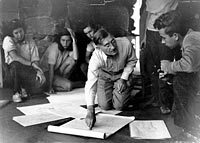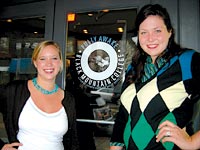The buildings are still there—one, a flat-topped structure, ashen and derelict along the shores of Lake Eden; another, a formal, pillared building called Lee Hall at the Blue Ridge Assembly, nearby. But to understand the legacy of Black Mountain College, which existed here between 1933 and 1956, it’s necessary to look beyond buildings, beyond the historical marker on U.S. 70 and beyond a fractured institutional memory. Today, the school’s legacy is spread among the memories of a dwindling number of students who attended it and the artistic and cultural contributions of its faculty and alumni.

Now, a feature-length documentary by two young filmmakers highlights the school’s brief but influential run at this unlikely rural mountain setting, mainly through interviews with former students. The film is titled Fully Awake, after an alumna’s description of the state of mind the school provoked among those who attended it.
Filmmaker Cathryn Davis Zommer was 23 years old in 2000 when she came under the sway of the Black Mountain College story. A graduate of UNC-Chapel Hill, she’d gone on to intern at PBS’ Charlie Rose Show.
“It was my job to keep people in the green room happy,” she recalls. “Well, I started running across all of these artists and celebrities who know about Black Mountain College. Then I started reading about the place. Then I got obsessed with it.”
That she could grow up in Asheville, attend school here, and come away with no knowledge of the influential college struck her as “a travesty.” Spurred by her findings, she began volunteering at the North Carolina State Archives so she could “get closer to the Black Mountain College collection.” In time, a preoccupation became a calling, and Zommer began raising funds to make a film.

She started by making a brochure. “It’s kind of embarrassing to look at now,” she admits. Zommer distributed it to friends and acquaintances, likely sources for funds. She asked them to donate $20. She hit up family members—parents, grandparents—and collected a few thousand. In time, nonprofits contributed several thousand more. The total outlay for Fully Awake amounts to somewhat less than $15,000.
“This was a true shoestring effort,” says Alice Sebrell, program coordinator at Black Mountain College Museum + Arts Center in Asheville, a learning center dedicated to the school’s history and legacy. “They begged and borrowed to make the film, and it’s really a testament to their persistence that it was made at all.”
While Zommer was working on her project, an Elon College film student named Neeley House was following an eerily similar path. House grew up in Henderson County but had heard scant mention of Black Mountain College; that is, until she took a college class on the Beat Generation at Elon. One day, her professor listed off the hubs of the Beats’ artistic ferment: Greenwich Village, San Francisco and Black Mountain. House was dumbstruck. “That can’t possibly be Black Mountain, North Carolina,” she recalls thinking.
It was, it turned out, and it wasn’t long before the undergraduate film major had a personal cause: to make a documentary that would bring public notice to the school’s vital place in American history.
Then, in 2005, she stumbled across a Web site for Zommer’s project. “We were making the same exact film,” she says.
The choice, she says, was to become competitors or collaborators.
From intellectual hotbed to artists’ retreat
“Separately, our films were incomplete,” says House, who is 23. While Zommer had focused her interviews on scholarly figures, House had concentrated on getting the stories of the school’s alumni and former faculty members. Their approaches, it turned out, were complementary. With the help of some eleventh-hour donations and the largesse of Elon College, which lent the filmmakers the use of its editorial facility last summer, the film came together at last.

Fully Awake has succeeded where others of its ilk have failed. According to Zommer and House, three similar documentaries about the school have been attempted, only to gather dust. “I think that those filmmakers just got overwhelmed,” says Zommer. “It’s really hard to tell the college’s story. It’s such a dense, layered subject. Making it harder is the fact that the school changed radically every year it was open. Through the 1930s, it was a groundbreaking learning institution. By the time you get to the 1950s, it was more like an artists’ retreat.”
Black Mountain College Museum + Art Center’s Sebrell agrees. “The story is complex—it’s not something you can grasp in five or 10 minutes. It can ignite your interest in that time, but it definitely defies simple descripton.”
Black Mountain College’s history begins in 1933 with an unemployed professor named John Andrew Rice. To be out of a job wasn’t uncommon in the early 1930s, the dire peak of the Great Depression, but Rice’s situation was a little different: His vision was too radical, too untethered for his former employer, Florida’s Rollins College. With a modest entourage, Rice found a promising site near the town of Black Mountain. The place was a camp during the summer, but its owners were willing to go into a lease agreement for the school to operate there during the rest of the year.
Today, small colleges and universities are fond of touting their “student to faculty ratio,” and by this measure, Black Mountain College remains unmatched. During its first year of operation, the school had 6 faculty members and 22 students, who lived bunkhouse style in camp cabins. Students raised food and cut hay on the college farm and studied shoulder-to-shoulder with some of the country’s greatest artists and writers. The school was democratically run, with decisions made by student-faculty consensus.
At large, 1933 was a remarkable year, heralding the contours of the rest of the century. Wiley Post became the first person to fly solo around the world; King Kong played across movie screens. Franklin Roosevelt became president of the United States; Adolf Hitler became chancellor of Germany; and, fleeing the former, Albert Einstein arrived on U.S. soil, where he would remain for the rest of his life.
Similar to Einstein, two of Black Mountain College’s early faculty were refugees from Nazism. Josef Albers, a former Bauhaus instructor, and his wife Anni, a Bauhaus-trained textile designer, arrived that first year. They brought with them an unmatched artistic vision and a sober, Germanic classroom mien.
In Fully Awake, Black Mountain College graduate Claude Stoller recalls Albers’ way of sizing up student projects. “He said ‘Ja, Ja. That’s a good beginning. That’s a good beginning.’ That’s the highest praise you could earn.”
Over the years, the school’s roster would grow to include such notables—both students and faculty—as painters Willem and Elaine de Kooning, Franz Kline, Dorothea Rockburne, Robert Rauschenberg, Cy Twombly, Jacob Lawrence, Ben Shahn and Kenneth Noland; architects Walter Gropius and Buckminster Fuller; choreographer Merce Cunningham; composer John Cage; film director Arthur Penn; writer and couture critic Francine du Plessix Gray; and poets Charles Olson and Robert Creeley.
Achievements? They were legion. Buckminster Fuller built his first geodesic dome here in 1949. In 1952, Cage held his first of his multimedia “Happenings” at the school. The next year, Cunningham started his influential Merce Cunningham Dance Troupe at Black Mountain College. Also in 1953, the school published the first edition of The Black Mountain Review, a literary anthology which spawned its own school of thought. Graduates went on to make their own marks on the nation’s cultural landscape.
But as a school founded and run by artists and thinkers, Black Mountain College was ultimately hobbled by its founders’ lack of appetite for administration, accounting and fundraising, the dismal science at the heart of successful institutions. While never flush, starting in the late 1940s, BMC began a slow drift away from solvency as the faculty and staff took less interest in administration and upkeep. In 1956, Charles Olson, by then a leadership figure at the school, made the decision to dissolve it.
Whatever the hazards of running the place, Black Mountain College’s impact on those who studied there apparently was indelible. Author Michael Rumaker, one of the former students interviewed by Zommer and House in Fully Awake, explains: “It really is a living presence within me, what I got to do at that place. You just never get over it. There’s no reason to get over it.”
But why, if it was so influential, is so little known about the place?
“That’s a question I’ve asked myself,” says House. “For a while it was a black sheep of a place. Outsiders, the world at large, viewed it to some extent as a place of homosexuals, of orgies, of communists. It was remarkably tolerant of viewpoints and ahead of its time in so many ways. For instance, they integrated ten years before Brown v. Board of Education.”
As the pinchers of a more conservative America closed in during the 1950s, a time when “artist” too often meant “communist” under McCarthyism’s narrow standards, Black Mountain College served a vital role as a haven for cultural refugees, people who “just weren’t accepted,” says House.
“It was a hideout, a retreat for people who didn’t fit the mold, and a chance for them to carry on with the important work they were doing. It was a place for people to continue being themselves.”
Apparently, that contrarian spirit is very much alive in the school’s aging student body.
“A friend asked me, ‘Why are you doing a film about a bunch of old people?’” says House. “Well, I told them, these aren’t your typical old people.”
Fully Awake will premiere Thursday, April 19, at 7 p.m. at the Fine Arts Theatre (36 Biltmore Ave.). A reception with the directors and BMC alumni will follow at Blue Spiral Gallery. Tickets are $25 or $8 for full-time students with I.D., available in person at Black Mountain College Museum + Arts Center in Asheville (56 Broadway) or by calling 350-8484. Proceeds from the event benefit the center. Event details are online at blackmountaincollege.org



Before you comment
The comments section is here to provide a platform for civil dialogue on the issues we face together as a local community. Xpress is committed to offering this platform for all voices, but when the tone of the discussion gets nasty or strays off topic, we believe many people choose not to participate. Xpress editors are determined to moderate comments to ensure a constructive interchange is maintained. All comments judged not to be in keeping with the spirit of civil discourse will be removed and repeat violators will be banned. See here for our terms of service. Thank you for being part of this effort to promote respectful discussion.